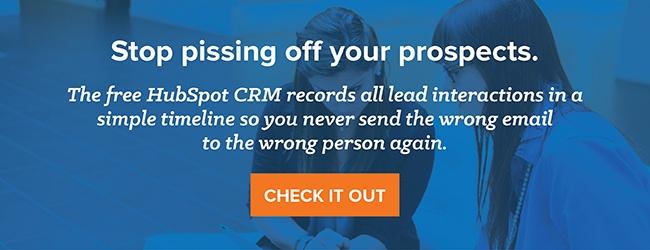

Connecting with prospects is an essential part of every salesperson’s job. Meeting someone in a social situation or professional capacity can range from being pretty fun or tremendously nerve-wracking depending on who you are talking to.
Lots of people find interacting with a total stranger a bit of a struggle. In many cases, there is a raised level of expectation that can create anxiety if the person you are talking to hates small talk. However, with just a few pointers you can be prospect-centric, polite and effective. This applies to face-to-face meetings as well as connecting over the phone.
What is small talk?
When we think about small talk, we usually think of polite conversation about unimportant or uncontroversial matters. In some cultures and regions and with some personalities, it is important to spend time on small talk to build a personal or human relationship before moving on to your business agenda.
Typical small talk topics include how a person is feeling, the weather or change in seasons, local sports teams, or regional and national news. Most people like to spend a little bit of time conversing on these subjects because it is a good way to get to know someone a bit better and makes the interaction more human. But some people hate small talk and you have to recognize and deal with them as a natural part of the sales process.
Why certain demographics hate small talk
People who get annoyed with small talk fall into a few different categories.
1) Severe introverts.
While not all introverts fall into this category, many introverted people have difficulty interacting with strangers. You can identify them by the long silences and curt answers they give to open-ended questions. Here's how a conversation might sound with one of these prospects:
Sales rep: How are you doing today?
Prospect: Good. [Silence]
Sales rep: I saw that you went to Yale.?
Prospect: Yes. [Silence]
It is nothing against you, it’s just your prospect's preference.
2) Incredibly busy Type A professionals.
Many business executives who are incredibly busy find small talk a total waste of time. You can probably empathize a bit with that category -- because of their limited time, they are wired to get right to the point and don’t feel the need to deviate from their agenda. Instead, they’re trying to figure out how to get the most activity in the shortest period of time. Most of them don’t intend to be mean, they have just been highly successful with being “direct” in the past.
3) Academics with multiple degrees.
I’ve encountered many prospects in this category, and I’ve found that serious academics or people with multiple degrees sometimes feel that small talk is gratuitous or even annoying.
4) People who don’t like talking about themselves.
Some people are simply unwilling to share personal information, which makes it hard to build rapport the traditional way. It doesn’t mean they are bad people, it’s just the way they roll.
Unfortunately, as a rule, these personas tend to hate the stereotypical salesperson. Before they even come to a meeting, they’re already thinking about previous negative experiences with legacy salespeople who didn’t add value to the conversation. Even though you’re an inbound salesperson who acts more like a consultant, these other interactions have given these personas a preconception of salespeople as relationship-oriented time-wasters that are not at their level.
It’s helpful if you have advanced notification if you are going to engage with this type of personality so that you can plan ahead, but you will be able to tell in the first two minutes if you are talking with someone who hates small talk because they are rarely shy about it. It’s usually a well-defined part of their personality and they use the technique to control the conversation.
5 Rapport-Building Topics For Prospects Who Hate Small Talk
1) A recent public presentation or blog post that they wrote or were mentioned in
“I saw that you were presenting at a local chapter of the San Diego Trial Lawyers association” or “I saw that you blog frequently regarding leadership” are great conversation starters. You don’t even have to ask a formal question. By making this statement, you are inviting the person to talk about something that they obviously spent a fair amount of time on professionally and should feel pretty good about opening up about.
2) Their academic background or business accomplishments
By calling out an advanced degree or categorizing their experience using an opener like, “It looks like you have a strong academic background that includes a law degree and business experience” or, “Five startups in 12 years is quite a track record!” you demonstrate respect and that you’ve done research. Notice these are statements, not questions, but they show you’ve taken the time to learn about your prospect and bring that information to the call.
3) Their longevity or experience with their current company
This one works because it’s not really small talk, it’s an in-between conversation that groups their business interest with their personal business. If they are at the company for less than a year, a good question can be, “What attracted you to this industry/company/location?”
If they have been at the company more than eight years (a long time in the 21st century) that is likely worthy of a statement that’ll provoke some introspection -- “I don’t see a lot of people who have that kind of longevity in one company. What’s made you stick around?”
4) Reference a press release for the company (extra points if they are mentioned)
This is another option that works because it is really business talk and the type of question that this persona really likes -- right to the point and not personal, while showing your research.
5) What do you want to accomplish in the next 30 minutes?
This classic question goes right to the heart of this personality. It’s direct, efficient, and gives control back to the prospect to explain their objectives.
If they don’t have a good idea of what they are looking to accomplish, have an option ready: “The way I typically run calls like this with [prospect’s title] is [your agenda].”
An offshoot of this question is, “How much time do we have?”
Small talk-haters are all about efficiency. If you can timestamp your discussion it can easily disarm them and allow them to concentrate on the subject at hand. If they say 15 minutes, you must be prepared to present the entire value proposition of your call in a truncated fashion with the key points and then pause for questions. But this should get the ball moving in the right direction.
3 Bonus Rapport-Building Tips
- Mirror your prospect’s directness with voice tone and seriousness. They have already shown that they all all business so keep any jokes or comments to a minimum unless you hear a change in voice tone.
- Use Dr. or Professor to address your prospects when applicable -- play to their professional titles.
- Expect and embrace silence so that you are being respectful of your prospect's preferences.
Good luck with prospects that are adverse to small talk! Have you used any of these strategies before? Were they effective?










![9 Tricks to Instantly Become More Charismatic [Infographic]](https://blog.hubspot.com/hubfs/charisma-boosting-tricks.jpg)